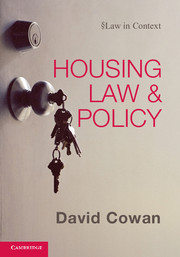Book contents
- Frontmatter
- Contents
- Preface
- List of abbreviations
- Table of legislation
- Table of international instruments
- Table of cases
- 1 Locating housing law and policy
- Part I Regulation of housing tenure
- Part II Access to housing
- Part III Rights and responsibilities
- 11 Security of tenure
- 12 Harassment and unlawful eviction
- 13 Property state and condition
- 14 Arrears
- 15 Anti-social behaviour
- 16 Mandatory possession proceedings
- Postscript
- Bibliography
- Index
13 - Property state and condition
from Part III - Rights and responsibilities
Published online by Cambridge University Press: 05 June 2012
- Frontmatter
- Contents
- Preface
- List of abbreviations
- Table of legislation
- Table of international instruments
- Table of cases
- 1 Locating housing law and policy
- Part I Regulation of housing tenure
- Part II Access to housing
- Part III Rights and responsibilities
- 11 Security of tenure
- 12 Harassment and unlawful eviction
- 13 Property state and condition
- 14 Arrears
- 15 Anti-social behaviour
- 16 Mandatory possession proceedings
- Postscript
- Bibliography
- Index
Summary
This chapter concerns the state and condition of property, including the private and public law obligations of landlords and local authorities. It is helpful when reading the material in this chapter to bear in mind three points:
The state and condition of housing was the concern which gave rise to an incipient housing and public health policy in the nineteenth century, and the then understandings about the cause of disease remain relevant. The Labour government in the 2000s did address the consequences of this history through two devices, the creation of a statutory risk-based HHSRS in the Housing Act 2004, Part I, and the non-statutory ‘decent homes’ test. Their development was founded on increasingly better understandings of the relationship between poor quality housing and health (on which there is now a considerable literature, see, for example, Prevalin et al. 2008). These have not affected the private law obligations, however, although in some cases there are overlaps.
Building on those new definitions, data from the 2008 English Housing Survey found that 7.4 million homes (33 per cent) were ‘non-decent’ with the highest proportion of non-decent homes in the PRS (44 per cent)(CLG 2010c: para. 2.21). Further, a potentially serious hazard under the HHSRS was present in around 4.8 million homes in 2008 (22 per cent) (para. 2.18).
When specifically considering the PRS, one has to bear in mind the findings in Chapters 3 and 11 above about the limited security of tenure. As Burridge and Ormandy (2007: 558) have put it, in a withering critique: ‘Private tenants may enjoy limited rights bestowed by legal text-books and upheld by judicial proclamation in theory, but such rhetoric is exposed by the realities of insecurity, procedural technicality, and legal complexity that demands expert but unreachable legal services’. One of the particular points made in that comment is that, despite relatively strong protection for disrepair in law, it is rendered practically useless by the temporary nature and easy accessibility of private renting. One can put this point rather differently to explain the policy inertia – the policy dilemma has been framed as a concern that further policy intervention will reduce the supply of housing in the much-needed PRS.
- Type
- Chapter
- Information
- Housing Law and Policy , pp. 312 - 329Publisher: Cambridge University PressPrint publication year: 2011



